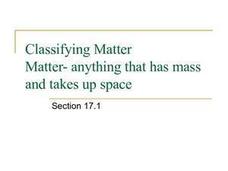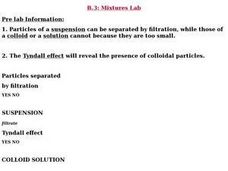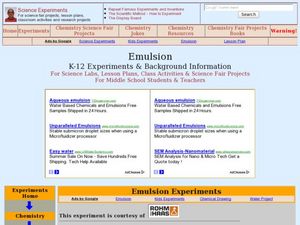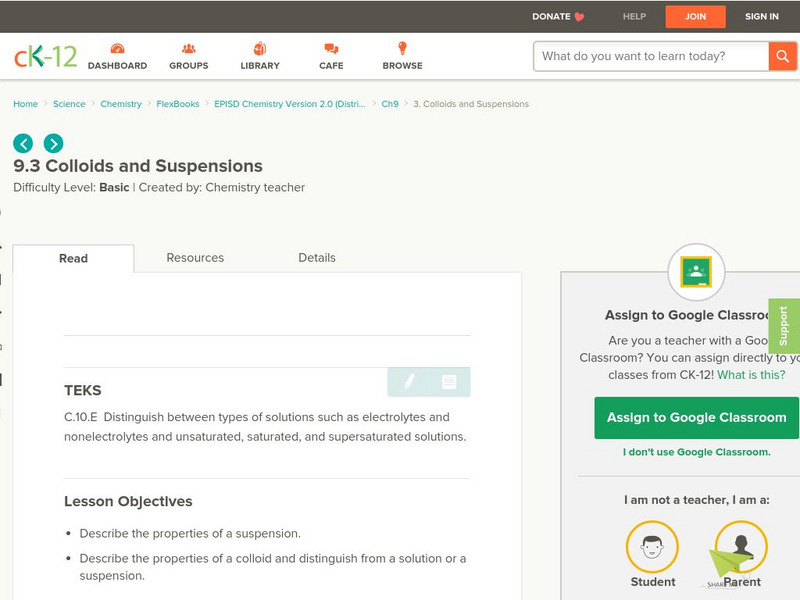Tyndall Effect Teacher Resources
Find Tyndall Effect lesson plans and worksheets
Showing 22 resources
Curated OER
Solutions, Suspensions, & Colloids Lab
In this solutions, suspension and colloid worksheet, students complete a lab experiment in order to determine if a given mixture is a solution, suspension or colloid. They are given six vials and they record their observations of each...
Curated OER
Mixtures as Solutions or Colloids and the Tyndall Effect
Students classify mixtures as solution or colloids by virtue of the Tyndall Effect. They make a cone and tape to fit over the lens of the flashlight. They turn out the lights in the room and shine the flash light at each of the jars and...
Curated OER
Classifying Matter
Details about matter and how it is classified are included here. The slides, with differences about homogenous and heterogeneous mixtures, have diagrams to support the definitions and your class will appreciate the summaries to assist...
Curated OER
Mixtures
In this mixtures pre-lab worksheet, students compare and contrast suspensions and colloids and solutions and colloids. Students describe the Tyndall effect. This worksheet has 10 short answer questions.
Curated OER
Mixtures Lab
Students classify different mixtures. For this mixtures lesson plan, students determine samples to be suspensions, colloids, or solutions and compare homogeneous and heterogeneous mixtures.
Curated OER
Water Testing
In this water testing pre-lab worksheet, students describe positive ions, precipitate, and the Tyndall effect. This worksheet has 14 short answer questions.
Curated OER
Solutions, Suspensions, and Colloids
In this solutions, suspension, and colloids worksheet, middle schoolers answer questions as it relates to their reading information about solutions, suspensions, and colloids. Students observe different examples and complete a chart as...
Curated OER
Water Unit
In this water activity, students review the properties of water including the density, boiling point, and evaporation. Students define mixture, solute, and solvent. This activity has 22 short answer questions.
Curated OER
Turbidy and Water
Students use observation skills in assessing the water quality of water samples in this activity and learn that the tastes and preferences of others can be different.
Science Geek
Colloids and Suspensions
Examine the properties of colloids and suspensions. A slide show defines each mixture and explains their properties. Pupils learn to identify each mixture and compare them to solutions.
Curated OER
Electrolytes and Colloids Worksheet
In this electrolytes learning exercise, students calculate percent composition, determine the electrical conduction of electrolytes, and explain the Tyndall effect. This learning exercise has 7 problems to solve.
Curated OER
WS 8.7 Solutions, Colloids and Suspensions
For this solutions, suspensions and colloids worksheet, students use diagrams to show how particles are different in each of these mixtures. They also distinguish between characteristics of each of these types of mixtures and categorize...
Curated OER
Solutions
In this solutions worksheet, students read about solutions, solutes, and solvents. Students compare solutions with mixtures that are not solutions. Then students complete 10 fill in the blank, 12 matching questions, and 10 terms into a...
Curated OER
Solutions
In this solutions worksheet, high schoolers read about the characteristics that define a solution such as the solvent and the solute and the homogeneous mixture. They are given a chart with the differences between solution, colloids and...
Curated OER
Emulsions
Students identify the characteristics and composition of emulsions. In this chemistry lesson, students classify household products according to emulsion type. They explain how to make the best emulsion.
Curated OER
Emulsion_ Compulsion
Students experiment with common household products to determine the properties of emulsions and how they fit into the classifications of matter through this series of lessons.
Science Struck
Science Struck: Explanation of Tyndall Effect With Labeled Diagram
Explains what the Tyndall Effect is and uses a diagram to model its impact on two different mixtures. Includes causes, examples, a look at suspensions and solutions, and an experiment to try.
Other
University of Bristol: Colloid Chemistry
An excellent site for learning about colloids. Content includes an explanation of what colloids are, types of colloids, how colloids are formed, properties of colloids, the Tyndall Effect, and examples of colloids.
CK-12 Foundation
Ck 12: Colloids and Suspensions
[Free Registration/Login may be required to access all resource tools.] In the following online tutorial students will describe the properties of a suspension and a colloid and distinguish from a solution or a suspension.
CK-12 Foundation
Ck 12: Chemistry: Colloids and Suspensions
[Free Registration/Login may be required to access all resource tools.] Defines colloid, properties of colloids, and explains types of colloids.
Chem Tutor
Chem Tutor: Solutions
An in-depth look at solutions and their properties. Includes practice problems for calculating solution concentration.
Curated OER
Educational Technology Clearinghouse: Clip Art Etc: Prof. John Tyndall
Tyndall was a natural philosopher and known for the Tyndall effect.





















